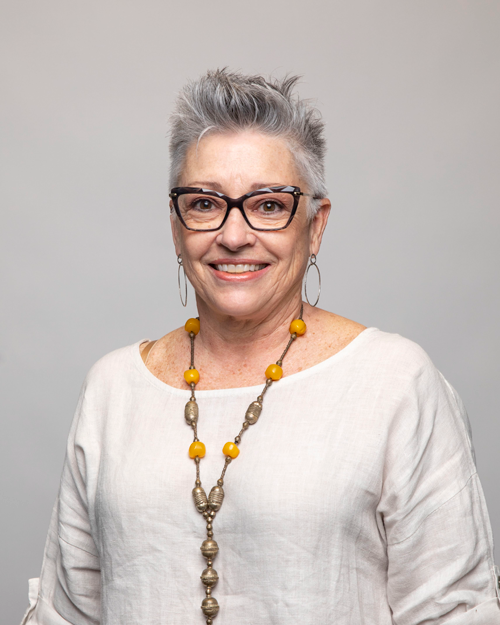Louanne Jacobs
Louanne Jacobs
Professor of Education
 Office:
Office:
HB Room 117
Contact Information:
Birmingham-Southern College
Box 549027
900 Arkadelphia Rd
Birmingham, AL 35254
Office Phone: (205) 226-4812
Office Fax: (205) 226-3065
E-mail: [email protected]
Brief Career Background:
Dr. Jacobs has over two decades of experience in K-12 public education. She served as a school-level reading specialist and a regional reading specialist. She also served as the Director of the Alabama A&M/UAH Regional Inservice Center. She has taught at both the undergraduate and graduate level and supervised doctoral research.
Educational Background:
B.S. Ed. (secondary education with certifications in English and history)- The University of Alabama - Birmingham
M.Ed. (p-12 reading) and A.A. certification (p-12 reading specialist) - Alabama A&M University
Ed.D. (educational leadership/literacy) - The University of Alabama/U.A.B. joint program
Areas of Academic Interest:
- Critical Literacy
- Children's and Adolescent Literacy
- Literacy and Social Justice
- Constructivist/Social Constructivist Pedagogy Content Area Literacy
Courses Taught:
ED 201 Introduction to Education
Surveys the history, purposes, practices, policies, functions, procedures, governance, and control of public and private schools in America as well as related issues.The student examines education and schooling from historical, philosophical, sociological, and psychological perspectives. Laboratory required. Fall, Spring.EPy 223 Human Growth and Development
Theories of human growth and development to help students understand the mental, social, and emotional patterns of development from conception to late adulthood. Laboratory required. Fall, Spring.ED 471 Education Seminar
Designed to increase the competencies and knowledge base of the teacher candidate with regard to legal issues, crisis management, parent-teacher conferencing, ethical considerations, diversity, classroom management, and professional development.This seminar must be taken in conjunction with clinical practice. Prerequisites: at least three years of college coursework, and admission to Teacher Education Program. Fall, Spring.ED 315 Reading I: Developmental Reading
Provides a framework to make appropriate decisions regarding the planning, implementation, and the assessment of instruction in the teaching of reading and the language arts for all learners in K-6 classrooms.Teacher candidates will carefully examine components of a balanced literacy program based on best practices rooted in research and current thinking about how children become literate. Instruction will be based on Standards for Reading Professionals developed by the International Reading Association and the National Council of Teachers of English Standards for the English language arts.This course includes working with special needs learners. Laboratory experiences in area K-6 schools include tutoring, small group instruction, and whole group instruction. Concurrent enrollment in ED 318 is recommended. Laboratory required. Prerequisites: admission to Teacher Education Program and ED 210. Fall.ED 316 Reading II: Reading Practicum
Expands upon theory, principles and practices developed in ED 315 and 318. A focus on content area reading, study skills, and the use of technology in the teaching of reading and the language arts is developed. Extensive laboratory experiences in area K-6 schools include tutoring, small group instruction, and whole group instruction. This course includes working with special needs learners. Concurrent enrollment in ED 318 is recommended. Laboratory required. Prerequisites: admission to Teacher Education Program and ED 315. Spring.ED 318 Children's Literature
Provides a framework to make appropriate decisions regarding the planning, implementation, and the assessment of literacy instruction using children's literature in the elementary classroom in all disciplines.This course allows the teacher candidate to explore books for children; the authors, illustrators, and poets who write for children; and the resources available for children's literature.The required laboratory experience in area K-6 schools provides a foundation for thematic teaching in the area of literacy learning.This course includes working with children with special needs. Concurrent enrollment in ED 315 is recommended. Laboratory required. Prerequisite: admission to Teacher Education Program. Fall.ED 410 Internship II
Full-time teaching internship in grade K, 1, 2, or 3 for six weeks under supervision of a certified teacher and a college supervisor. Prerequisites: enrollment in ED 411 and 471 and admission to Teacher Education Program. Fall, Spring.ED 411 Internship III
Full-time teaching internship in grade 4, 5 or 6 for six weeks under the supervision of a certified teacher and a college supervisor. Prerequisites: enrollment in ED 410 and 471 and admission to Teacher Education Program. Fall, Spring.ED 199 Exploring Teaching
A field-based interim project that requires observation and participation in classrooms at the elementary, middle-school, or high-school level. Specific requirements are listed in the Interim Term Bulletin, which is published every fall. Interim.ED 319 Teaching Secondary Reading
Provides theories, methods, and materials necessary to teach reading in the content areas to students ages 9 through 16. Improvement and remediation of reading are emphasized in relation to middle and secondary school students. Laboratory required. Prerequisite: admission to Teacher Education Program. Spring.

